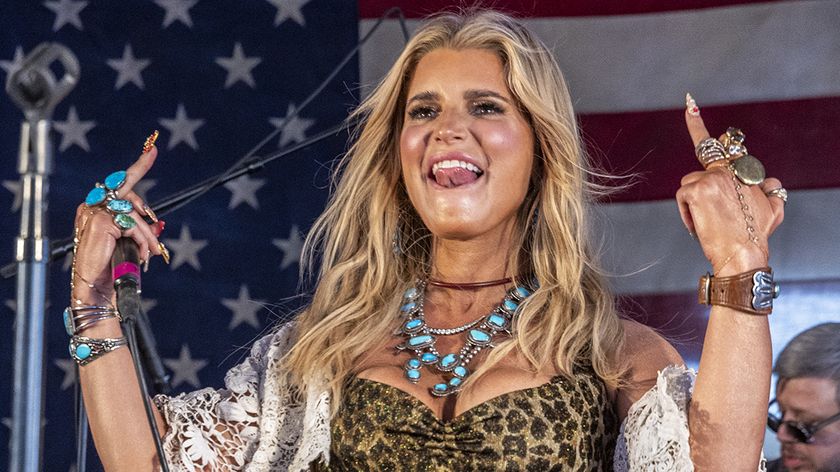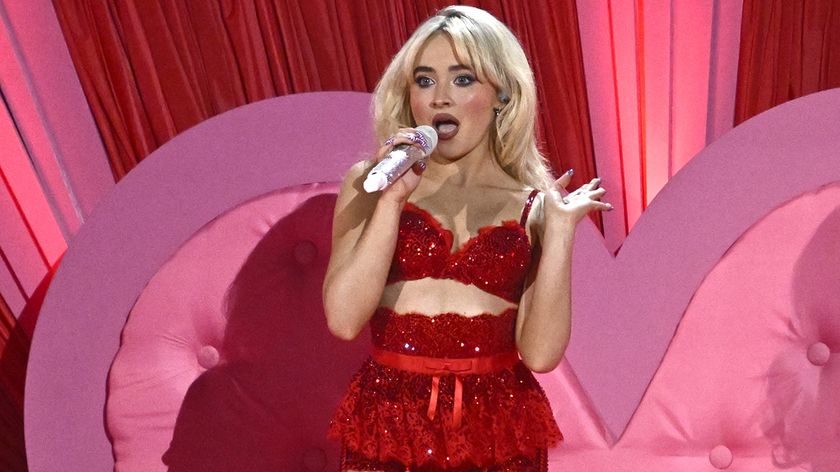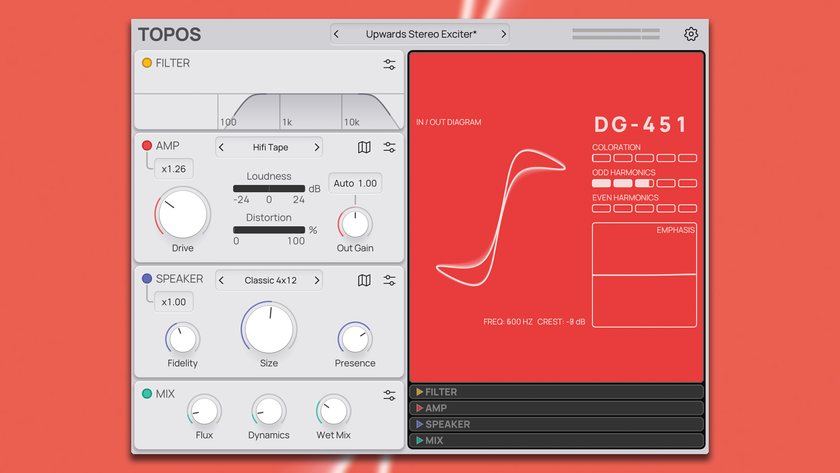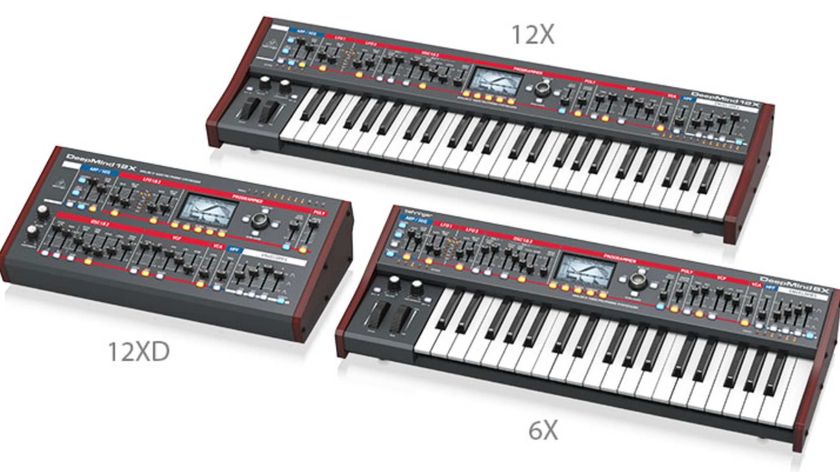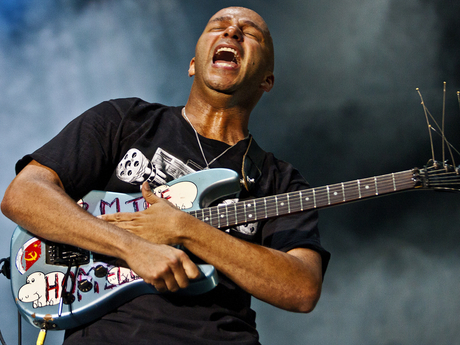
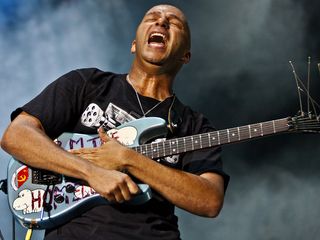
Tom Morello just loves his "Arm The Homeless" guitar. So much so that he uses it all over his new Nightwatchman album, World Wide Rebel Songs. © Andrew Goetz/Corbis
"I like so many aspects of the guitar hero culture," says Tom Morello, who's certainly made his mark in groups such as Rage Against The Machine, Audioslave and Street Sweeper Social Club. "Getting on stage and rocking an arena is an experience that so few get to realize. When you see waves of people involuntarily reacting to the vibrations coming from your guitar and amp, it's the answer to countless teenage dreams."
In the guise of his acoustic-folk alter ego The Nightwatchman, however, Morello has always dialed down the six-string feats of wizardry, adopting a modern-day Pete Seeger meets Woody Guthrie sound and spirit. "At first, it was very important for me to let the songs and the lyrics speak for themselves," he explains. "The guitar wasn't supposed to the focal point. It was more like the engine that drove the words."
Much of that has changed on Morello's brilliant new Nightwatchman album, World Wide Rebel Songs. Due out 30 August on New West Records, it comes hot off the heels of Morello's Union Town EP and sees the singer-guitarist working with a full electric band, the Freedom Fighter Orchestra (comprised of Dave Gibbs on bass, Carl Restivo on guitar and piano, Chris Joyner on keyboards and Eric Gardner on drums). Not only that, but on many a good portion of the record's dozen cuts, Morello expands (or revisits) his sonic range by strapping on his familiar "Arm The Homeless" and "Soul Power" guitars and letting loose with badass riffs and solos on tracks such as It Begins Tonight and Speak And Make Lightning.
"At its heart, this is still very different from a Rage record or an Audioslave album or what have you," Morello explains. "The same guy who nervously yet bravely stepped up to the open mic nights with an acoustic guitar is definitely there. But I felt fine with bringing out the heavy artillery when needed. Sometimes big messages need a big sound."
MusicRadar sat down with Morello recently to talk about World Wide Rebel Songs and how the guitarist is connecting the bridge between his Rage persona and that of The Nightwatchman. In addition, we discussed his collaboration with Ben Harper (who guests on the cut Save The Hammer For The Man), his guitars and gear, and what the future might hold for RATM.
Brendan O'Brien produced your previous Nightwatchman albums, but you helmed the new one yourself.
Get the MusicRadar Newsletter
Want all the hottest music and gear news, reviews, deals, features and more, direct to your inbox? Sign up here.
"That's right. A few years ago, I built a studio in my house, Veritas Studios, and I've become much more comfortable doing things by myself. I produced the Street Sweeper records here, I worked on the Iron Man 2 soundtrack here… It's really a good situation, and it allows me to take my time and get things done without all kinds of distractions.
"Through the years, in working with Brendan on Rage Against The Machine and Audioslave and The Nightwatchman, I've learned so much about production and making the hard decisions. In fact, he solicited me to do the first Nightwatchman album. He called me up and said, 'Hey, I hear you're writing some protest songs…' But this time out, I felt it was time to do it myself and follow my own vision, as it were."
As a producer, what is Tom Morello like to work with?
[laughs] "He's interesting! In truth, I'm just as bossy on myself in the studio as I am outside of the studio. But I did give myself more time to get things done. The luxury of having a studio at home allows me to raise a family by day and raise hell by night."
On earlier Nightwatchman albums, you hinted at a band sound and kept electric guitars to a minimum. The new album, however, is pretty much a full band record, and there's electrics all over it.
"Well, the Freedom Fighter Orchestra is The Nightwatchman's backup band, and they're a fine group of musicians that I really gel with and have a lot of fun making music with. Also, on this record, I felt much more comfortable melding the worlds of Tom Morello 'electric guitar hero' and Nightwatchman 'brooding folk singer' [laughs].
"Where that evolution first happened was when I played the electric version of The Ghost Of Tom Joad with Bruce Springsteen. That was the first time I ever sang on stage with an electric guitar. At first, I wanted The Nightwatchman material to stand in very stark contrast to Rage and Audioslave. But I've mellowed a bit on that now.
"I enjoy playing big riffs and guitar solos. That's who I am as an artist. So I finally got to a point where I could put it all together. There's plenty of grim folk tales of retribution on this record, but there's also big, 'Nugent-esque' guitar solos all over it." [laughs]
Did playing with Bruce give you the confidence you needed to be more of a rock solo performer?
"It wasn't so much that I needed confidence; it just never really occurred to me that I really could blend those worlds. I love the idea of the lone, guerilla-style acoustic singer - "
But you can be both. You can do that and you can strap on and electric and sing rock protest songs. Dylan did it back in the day.
"Exactly! There you go. But yeah, playing with Bruce was kind of an epiphany moment for me. I'm going to do it both ways now: some nights will be the big rock band with the Freedom Fighter Orchestra, and other nights will be solo acoustic nights."
On the album's first cut, Black Spartacus Heart Attack Machine, things rock pretty hard. But something I want to point out: I notice a difference in your singing voice - you sound very comfortable as a vocalist, whereas in the past, you seemed a bit self-conscious.
"Thank you. From the very first moment I first stepped out on a stage at an open mic night in the San Fernando Valley, I've been figuring this out. I remember a saying that the Gray Panthers had: 'Speak out even if your voice shakes.' I've been doing this for 10 years now. At first, my attitude was, I have a song to sing - it didn't matter if I wasn't going to win American Idol! [laughs] I was going to do this sincerely and unapologetically. So it's been a learning process. But I'm very confident in the vocal booth now."
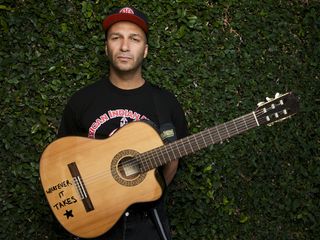
Morello's "Whatever It Takes" guitar is a nylon-string Ibanez Galvador. © Josh Sanseri/Retna Ltd./Corbis
There's a real spiritual vibe to many of the songs, even when there's anger in the lyrics. Do you listen to any spiritual music?
"No, no. I think it's just something that might lurk deep within me. As a lyricist, I simply let things come. There have only been a few times, like on the Union Town record, where I said, 'OK, now I'm going to write a song about this.' Everything else just comes out, which I think is the most honest and revealing way to be a songwriter."
It Begins Tonight is totally rifftastic. I can almost hear Rage Against The Machine doing it. It certainly seems as though you've reconciled the Tom Morello from Rage with Tom Morello The Nightwatchman.
"On that song, I would definitely say the bridge construction is complete. I'm putting some Rage-style guitar back in, sure. It's a 50-50 of both worlds. It's a dark song about solidarity, but it's got the humongous 'Morellian' riffs. On the guitar solo, I kept remixing it, and each time I was like, 'Turn the solo up, turn the solo up, turn the solo up.' [laughs] I wanted there to be no mistaking where I was going musically."
The main riff is awesome. How long did it take to come up with that?
"That was one of those one-second riffs. I didn't have to labor over it and try different combinations or anything. I wrote it at the end of The Fabled City tour, and the minute I had it done I said, 'This is going to be on the next record, no doubt about it.'"
Even though Rage did protest songs, with The Nightwatchman you remind me of Dylan: you started out acoustic and then added electrics to the mix.
"That's right. It's funny: I never thought that protest songs and electric guitars had to be mutually exclusive. I just wanted to feel comfortable in my own skin playing Nightwatchman songs on an electric. This record is the 14th album of my career, and it's the fourth Nightwatchman record. This is what I do. I play the electric guitar, I play acoustic, I make records, I sing - it's all come together."
Save The Hammer For The Man is co-written with Ben Harper, who also performs with you on the song. How did this collaboration come about?
"Ben and I have been friends for some time, and he's been very generous and performed at a number of benefit shows that I put on, including the last Justice tour. We had some problems getting a few people for some of the shows, and Ben sent me an e-mail saying, 'Dude, let me know if you want me to put the hammer down.' [laughs] And I wrote back and said, 'Ben, save the hammer for The Man.' [laughs]
"We just knew there was a song in that title. So when I got back from the tour, I threw my acoustic in the car, drove over to Ben's place and banged the song out with him in a couple of hours. Ben's a great guy, a fellow traveler both politically and musically, and an awesome singer. It was great working with him."
Speak And Make Lightning - man, you play a hot-ass country solo! You're pickin' and grinnin' on that.
[laughs] "I've got guitar skills that have never appeared on record. When I used to practice for eight hours a day, it wasn't just for nothing. I've been playing like that for years and years. I enjoy that kind of thing. I can't say I study anybody per se. It's just part of me, like the way I write lyrics. To me, playing like that isn't all that funny and unusual, because I always hear me play like that. I just never put it on an album before."
Which one of your guitars did you use for the solo?
"Hmmm…that's a trick question. I can never remember. Let's see, I think it's the 'Arm The Homeless' guitar."
On a couple of cuts, particularly the title song, you play harmonica. How do you rate your harp skills - somewhere between Bob Dylan and Stevie Wonder?
[laughs] "It depends which Dylan record you're talking about, because he's pretty great on some records, and on other ones it's like he's playing a different song from what the rest of the band is doing. I love playing the harmonica. It's part of the protest-singer vibe, the sound of the movement. I don't claim to be a virtuoso in any way, but I think I get by."
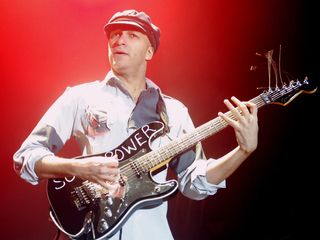
Morello with his highly customized "Soul Power" guitar. © Reuters/CORBIS
What were your main guitars for this album?
"Well, the main guitar is the title of the first track, Black Spartacus Heart Attack Machine. It's a song about my new guitar. I never know the names and model numbers, but it's a Gibson steel-string acoustic. When I was writing these songs and puzzling over how I was going to record them, I knew I wanted the acoustic sound to be different. I found this Gibson and fell in love with it. Mick Jones from The Clash referred to his guitar as a 'heart attack machine.' So in keeping with that, and the fact that this guitar is black, and if you're familiar with the history of Spartacus, who led the slave revolt in ancient Rome, it all came together."
Do all of your guitars have names?
"Pretty much. So that was the main acoustic, the Gibson 'Black Spartacus Heart Attack Machine.' After that, I used the Ibanez Galvador, which is the nylon-string acoustic I used primarily on the previous Nightwatchman records."
That's the 'Whatever It Takes' guitar.
"Exactly. For electrics, it a mix-and-match affair, by and large. The 'Arm The Homeless' guitar is present and accounted for, certainly for solos - I think that's basically what I used. Let's see, for It Begins Tonight, I used my old Gibson Les Paul, which has been the riff-doubling hard rock guitar I've used since the first Rage record. There was a Strat I used on a few songs... I was basically pulling guitars off the wall."
What about your "Soul Power" guitar, did that make it onto the record?
"'Soul Power' certainly made an appearance, as well. It's one of my heavy rotation guitars. You know, I recorded this album a little while ago, so I should've kept better notes. All the main guitars people associate me with, they're on here. But the main one is the 'Black Spartacus.'"
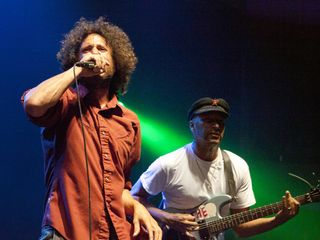
Zack de la Rocha, Morello and the rest of Rage will be rocking LA on 30 July. After that...? © Paul Hebert/Corbis
Amp-wise, did you make any changes from what you've previously used?
"The amps are always the same - a Marshall 50-watt 2205 half-stack with a Peavey 4x12 cabinet. I get such a huge sound from that amp. I've used it for every rock concert I've done since high school."
Any new effects?
"Nope, everything's the same. The same Dunlop Cry Baby wah, the original DigiTech Whammy - and I mean the original, not the reissue. Let's see…a DOD EQ, which is just used as a boost, and the Boss [DD-2] digital delay. That's it, really."
Shifting gears, what's next for Rage? You've said recently that the band is in a very good place. Can we ever expect a new album?
"What's next is we have our own show on July 30th at the LA Coliseum. We've established our own festival called LA Rising. It's put on by us, we pick the bands, and we're going to go play in front of 60,000 people. So it's Rage, Muse, Rise Against, Ms Lauren Hill, Immortal Technique and El Grande Silencio - the later of whom are a rocking en espanol band. So we're trying to establish our own Coachella or Lollapalooza."
You're playing little joints.
[laughs] "Small clubs, exactly! As far as anything else, yes, we're in a good place. We work at our own pace, and at the moment, the only thing on the docket is that show. If there's going to be more shows, if there's going to be an album, we'll let you know. Right now, that's all that's going on."
Joe is a freelance journalist who has, over the past few decades, interviewed hundreds of guitarists for Guitar World, Guitar Player, MusicRadar and Classic Rock. He is also a former editor of Guitar World, contributing writer for Guitar Aficionado and VP of A&R for Island Records. He’s an enthusiastic guitarist, but he’s nowhere near the likes of the people he interviews. Surprisingly, his skills are more suited to the drums. If you need a drummer for your Beatles tribute band, look him up.

"Reggae is more freeform than the blues. But more important, reggae is for everyone": Bob Marley and the Wailers' Catch a Fire, track-by-track

“Part of a beautiful American tradition”: A music theory expert explains the country roots of Beyoncé’s Texas Hold ‘Em, and why it also owes a debt to the blues


